The Top 50 Guitar Riffs Of All Time: 25-1

Sad But True
So, you’ve already seen the first half of our Top 50 Guitar Riffs Of All Time countdown, and you’ve heard what the stars have to say. Now it’s time for the main event; the smackdown, if you will.
You voted in your thousands, but who did you chose? This time, we’re not even going to give you a sneaky peak via thumbnails. You’ll just have to read the whole damn list and worship at the bloody altar of the riff. And kicking off part two, here’s a band that know all about that…
From 1991's eponymous ‘Black Album’ that saw Metallica complete their transition from thrash metal heroes to mainstream rock titans, Sad But True was one of James Hetfield’s first experiments in tuning down to D, adding girth to a riff with considerable groove.
Why you love it:
"Sad But True, Metallica. That riff just makes you want to groove!" (Thanks, darrengodzilla)
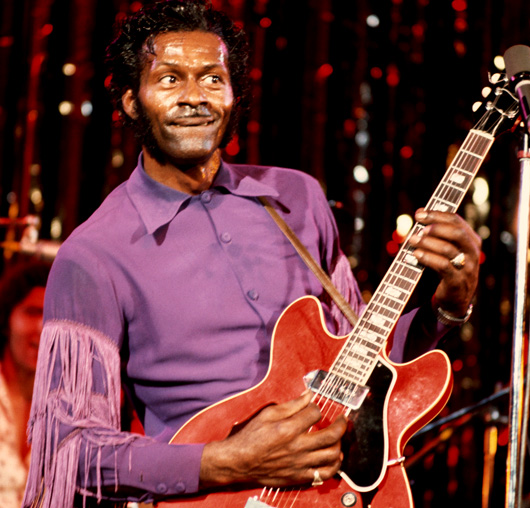
Johnny B Goode
Chuck Berry’s 1958 single Johnny B Goode is almost certainly the song that we’d play to aliens from a distant galaxy in order to demonstrate the concept of rock ‘n’ roll .
It matters not that Chuck lifted the intro riff wholesale from Louis Jordan’s 1948 release Ain’t That Just Like A Woman - as Oscar Wilde once said, “talent borrows, genius steals.” And since 1985, whole generations of kids have been inspired to pick up guitars by Johnny B Goode as performed by Marty McFly.
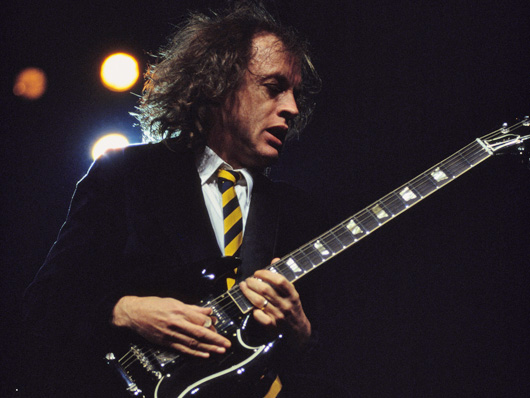
Whole Lotta Rosie
As far as we know, this is the only ahem, entry in the Top 50 inspired by sexual relations with a 19 stone woman.
As with all AC/DC, it’s best just to ignore the lyric sheet and soak up the rock ‘n’ roll; in this case a fine example of their hard-edged Bon Scott-era sound.
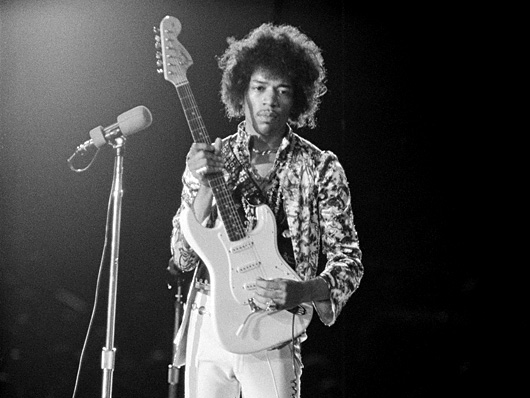
Purple Haze
When Jimi Hendrix arrived on the London scene in 1966 he scared the hell out of contemporaries like Eric Clapton and Pete Townshend, and set about rewriting the electric guitar rulebook forever.
Recorded the following year, the four decades since its release haven't made Purple Haze sound one fraction less exciting or otherworldly.
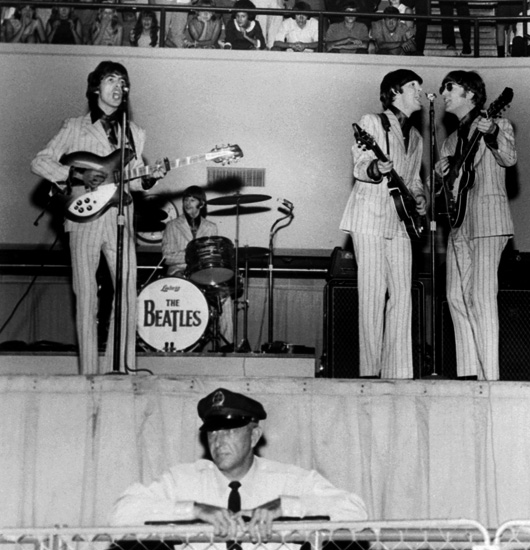
Paperback Writer
In 1966, The Beatles would play their last ever concerts to paying audiences and record Revolver – many people’s nomination for the greatest album of all time. Amidst the Revolver sessions, Paperback Writer was recorded and released as a single backed with possibly the greatest B-side of all time, Rain.
Known more widely for its incredible a cappella vocal intro, Paperback Writer also contains one of The Beatles’ best overdriven guitar riffs. You haven’t heard it properly until you’ve heard it in mono.
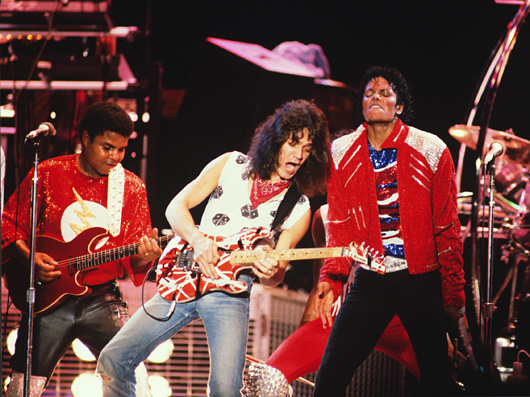
Beat It
Eddie Van Halen rightly gets much respect for his screaming guitar solo in Beat It, Quincy Jones' attempt to coerce Michael Jackson into including a "rock 'n' roll song" on Thriller.
But this isn't a search for the best guitar solo of all time. Oh no. Here we're all about the riff, and that was played by Toto guitarist and sessioneer extraordinaire Steve Lukather.
Lukather recalls: "Initially, we rocked it out as Eddie had played a good solo, but Quincy thought it was too tough. So I had to reduce the distorted guitar sound and that is what was released."
Why you love it:
"Beat It has to be up there with the best!" (From @richiemeister via Twitter, thanks)
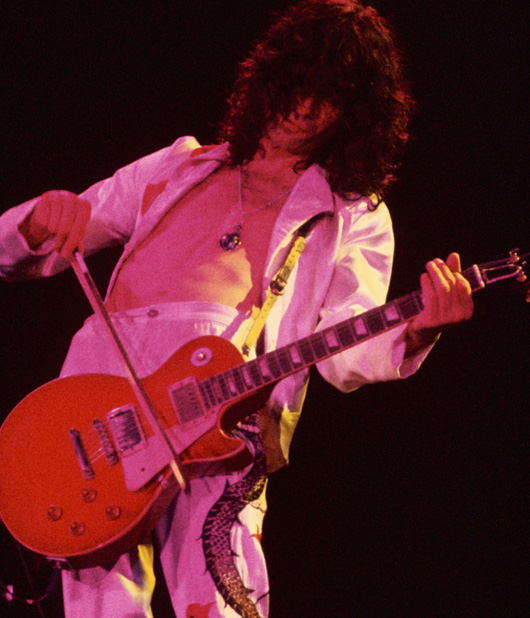
Black Dog
Another entry performed by Jimmy Page, the Black Dog riff was actually penned by his Led Zeppelin bandmate, bassist John Paul Jones.
Jones explains its origins: "I wanted to try an electric blues with a rolling bass part. But it couldn't be too simple. I wanted it to turn back on itself. I showed it to the guys, and we fell into it. We struggled with the turn-around, until Bonham figured out that you just four-time as if there's no turn-around. That was the secret."
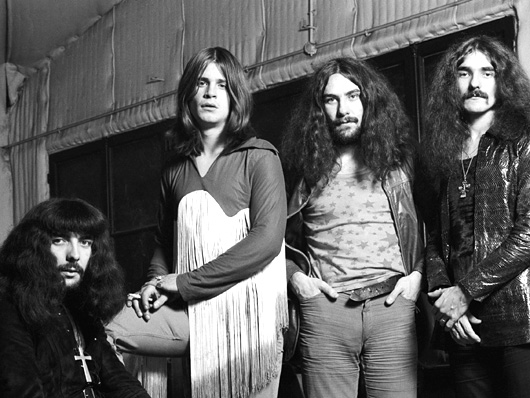
Iron Man
Apart from giving the world a library of dark, disturbing riffs and basically inventing heavy metal, another thing we have Tony Iommi and his Black Sabbath bandmates to thank for is giving birth to stoner rock.
Without Iron Man, a whole genre simply wouldn't exist. And where would that leave The Melvins?
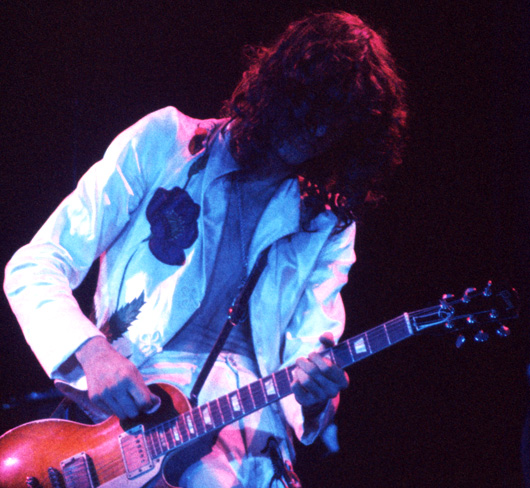
Heartbreaker
Okay, okay. You guys like Led Zeppelin. You think Jimmy Page has written some of the best riffs ever. We get it. Hell, we agree with you. But please give someone else a chance.
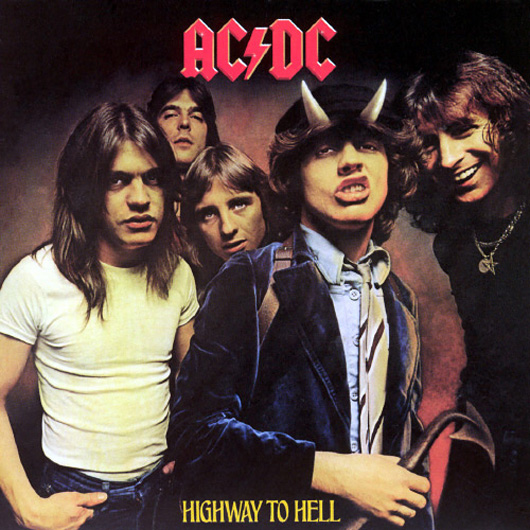
Highway To Hell
An ode to the rigours of life on the road, Highway To Hell's simple but utterly infectious main riff was written by rhythm guitarist Malcolm Young.
The opening track on the album of the same name, this is the intoxicating rasp of AC/DC distilled.
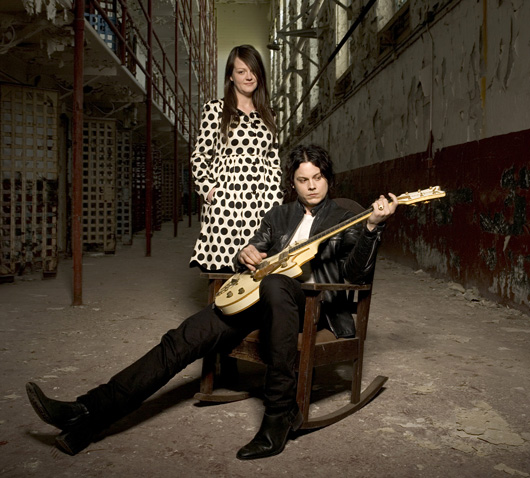
Seven Nation Army
When the famously bass-free White Stripes released this as a single in 2003, those who didn't know better assumed that they'd hired a bass player.
The reality was that Jack White's Kay hollowbody had simply been hooked up to an octave pedal to play a riff so catchy that it's since become a terrace chant at football matches. Jack would probably call it "soccer".
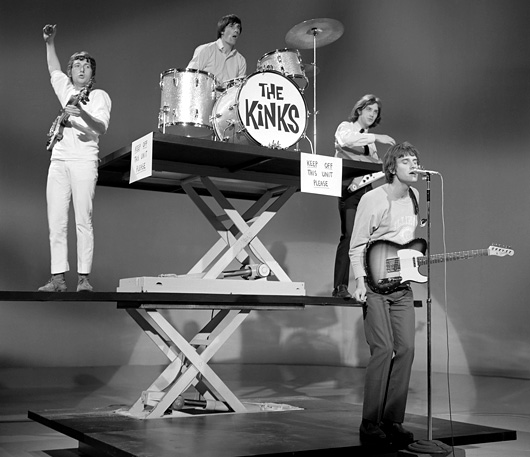
You Really Got Me
When Dave Davies slashed the speaker in his little green Elpico amplifier with a razorblade in July 1964, he probably didn’t realise that rock music would never be the same again.
As simple and direct as can be, You Really Got Me's brilliant, rasping two-chord riff came about from an attempt at working out The Kingsmen’s Louie Louie.
Brian May perhaps sums up its importance best: "Ray Davies and Dave Davies planted the seed which grew into riff-based music." For more from Brian on The Kinks, check out our exclusive interview here.
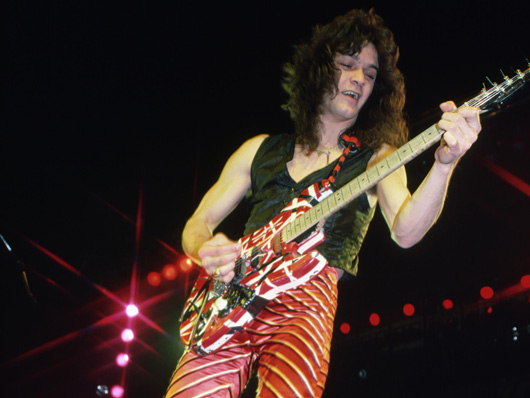
Ain't Talkin' 'Bout Love
It's difficult to emphasise just how much Eddie Van Halen revolutionised the electric guitar for players of a certain age, but suffice to say, many a teenage rock fan lost hours of their lives tying their fingers in knots trying to replicate the great man's riffs and solos.
Ain't Talkin' 'Bout Love is one of EVH's finest moments, aided and abetted by an orange, script-logo MXR Phase 90 pedal.
Why you love it:
"Best riff EVER? I gotta top 10 but VH Ain't Talkin' 'Bout Love is kickin' the ceiling." (From @GuitarTricks via Twitter, thanks)
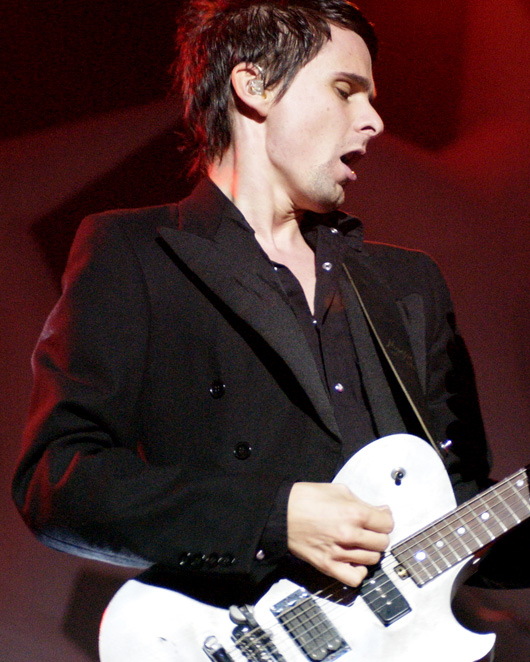
Plug In Baby
It’s astonishing that Plug In Baby’s manic, spiralling guitar line manages to pack such urgency and bite whilst cramming in so many damned notes.
Surely one of the widdliest riffs here, it flirts with the neoclassical without becoming over-indulgent – a trait that would permeate Muse’s output from Origin Of Symmetry onwards and make them one of the most unique bands of the noughties.
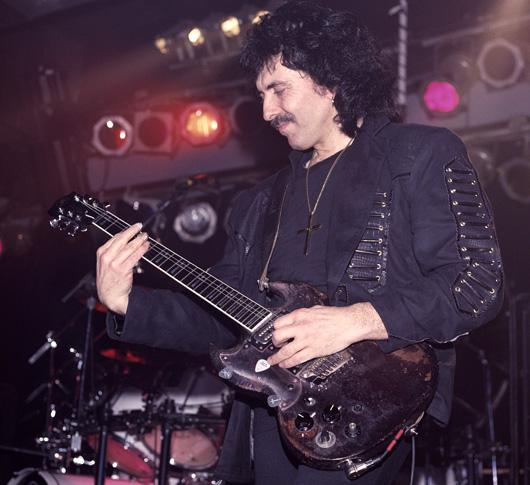
Paranoid
Sometimes it's worth working through lunch. Just ask Tony Iommi.
Sabbath's riff lord came up with his parts for Paranoid while the rest of the band were out buying lunch and it went on to become the their most famous song. Just think of that next time you're gulping back the last of that cheeky lunchtime pint.
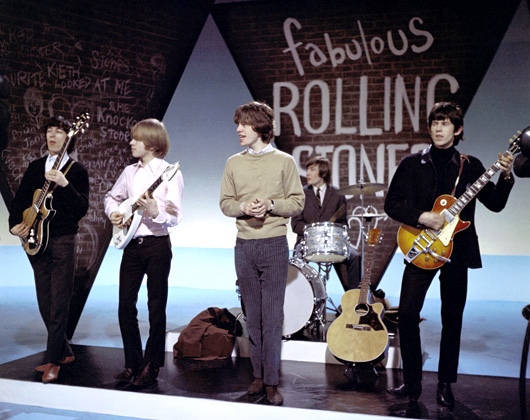
(I Can't Get No) Satisfaction
Keith Richards' most famous guitar part nearly didn't make it off the cutting room floor. Keith insists that the riff came to him in his sleep, and that he originally intended for it to be a horn part.
Of the studio recording that would go on to sell innumerable Maestro fuzzboxes, The Rolling Stone remembers: "This was just a little sketch, because, to my mind, the fuzz tone was really there to denote what the horns would be doing."
Conclusive proof that, while you can't always get what you want, if you try sometimes, you might find that you get what you need. Ahem.
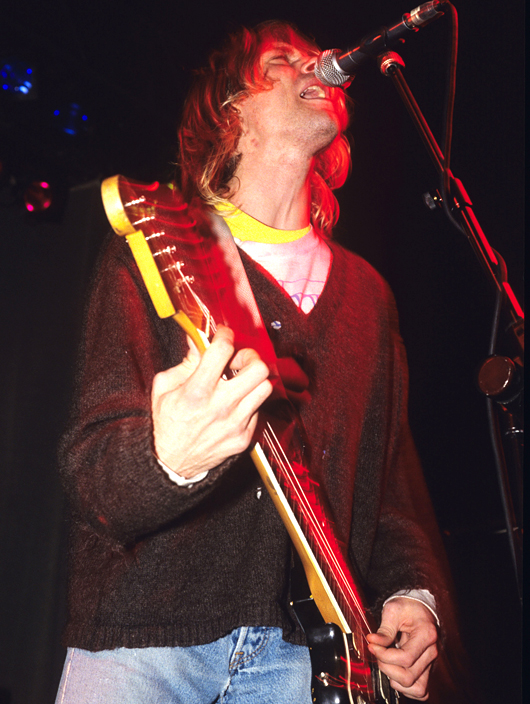
Smells Like Teen Spirit
When Nirvana's Nevermind LP replaced Dangerous by Michael Jackson at the top of the Billboard chart in January 1992, for many critics it was the moment that the 1990s really began.
Rumours of the death of eighties pop and hair metal at the hands of grunge have since proven to be greatly exaggerated. Depending on your perspective, the hit-packed Nevermind was either the Trojan horse that allowed punk rock to enter the mainstream or proof that alternative rock was a viable commodity.
Theorising aside, nearly two decades on from its release in 1991, nothing ignites a moshpit in a rock club quite like ‘Teen Spirit’s scratchy, visceral opening riff and the avalanche of distortion and pounding drums that follows in its wake.
The riff’s undeniable resemblance to Boston’s More Than A Feeling was something that Nirvana laughingly acknowledged, but as to which is the most enduring, there’s no contest. Where do Boston feature in this poll?
Why you love it:
“Best riff of all time? I mean come on it HAS to be Smells Like Teen Spirit from Nirvana!” (From Camilla via Facebook, thanks)
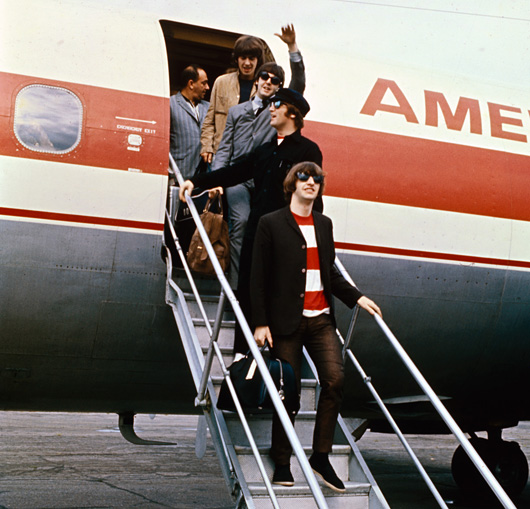
Day Tripper
Late 1965 saw The Beatles embark on a period of invention and creativity unrivalled in pop history.
This largely Lennon-penned rocker's signature riff - likely recorded using George's Gibson ES-345 and John's Rickenbacker 325 - is played in E, A and B as the song progresses. Guitar hooks don't come much catchier than this.
Why you love it:
"The Beatles quite rightly get plenty of respect for their amazing harmonies and studio innovations but people often forget that they wrote some totally awesome guitar riffs too." (From Paul - no, not that one! - via email, thanks)

Enter Sandman
Before Enter Sandman, Metallica were a thrash metal band. A Grammy Award-winning thrash metal band, but one stuck in a heavy metal ghetto nonetheless. Enter, ahem, their biggest hit...
We've heard it played all over the radio, by covers bands, by Metallica themselves and in guitar shops on countless occasions since 1991. Somehow, we're still not sick of it. And neither are you.
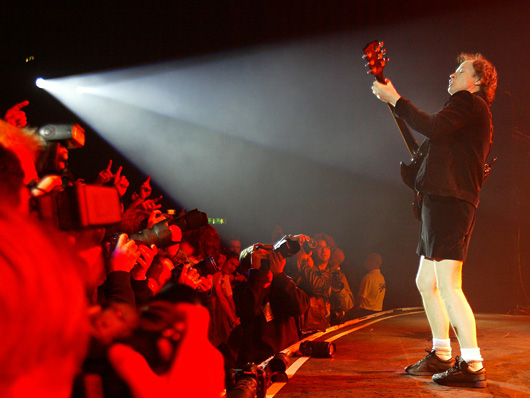
Back In Black
AC/DC's tribute to Bon Scott is regarded with much affection by the band's fans. It's also the one AC/DC song that people who don't own a single one of their albums are most likely to play air guitar along with. It's even featured in a Gap advert.
Why you love it:
"Back In Black easily." (Thanks, gibsonslinger)
"Can't get past Back In Black." (Thanks, SimonBradley)
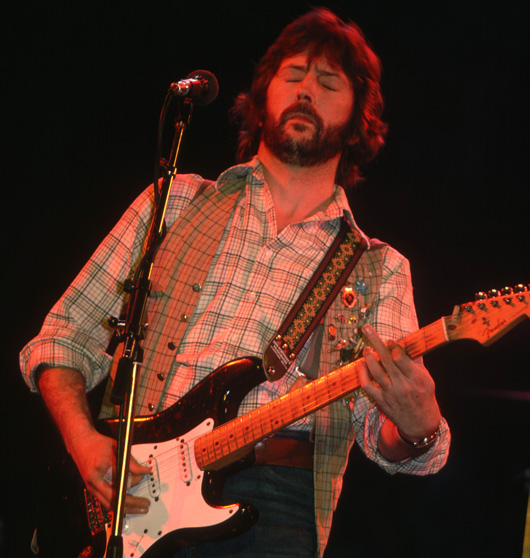
Layla
God's most famous riff was actually penned by Duane Allman, but performed by Clapton on Brownie, the 1956 Stratocaster that featured throughout Layla And Other Assorted Love Songs, Derek And The Dominos' classic 1970 LP.
Penned about Clapton's future - then George Harrison's - wife Patti Boyd, Boyd can boast the rare accolade of having three of the most successful love songs of all time written about her: The Beatles' Something, Clapton's Wonderful Tonight and this.
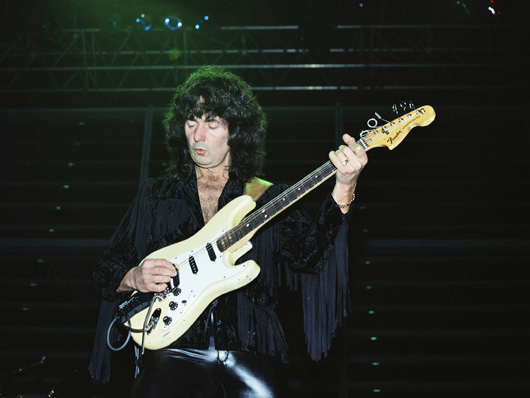
Smoke On The Water
There are guitar riffs, and there are institutions. Smoke On The Water has topped many 'greatest ever riff' polls over the years, but not this one.
John Petrucci thinks it's the best riff of all time. So does Joe Bonamassa. Even Tony Iommi says it's up there with some of his best. It might not be enough to get a place on the podium, but 10 percent of the total public vote and fourth place is none too shabby.
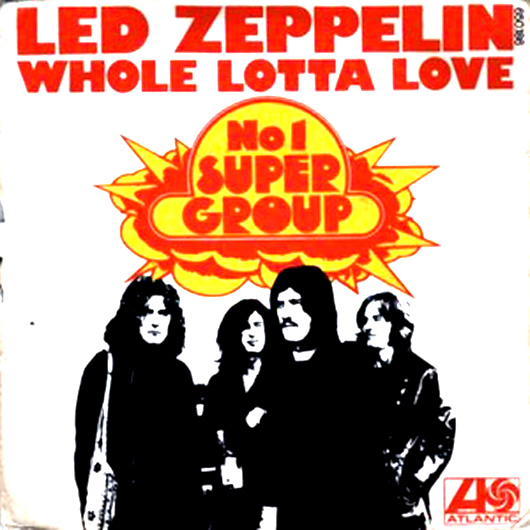
Whole Lotta Love
Jimmy Page can boast the most entries of any guitarist in our/your Top 50, with five Zeppelin riffs getting your votes.
Its association with cherished UK TV show Top Of The Pops might account in part for it reaching the dizzy heights of the top three at the expense of other Led Zep classics. It's certainly been much-covered over the years, with the aforementioned Top Of The Pops theme deriving from the Collective Consciousness Society's version.
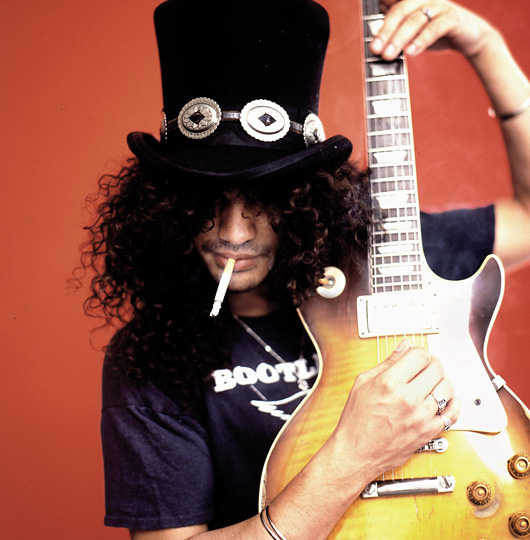
Sweet Child O' Mine
In some competitions, second place is as good as last, but not here. Slash's iconic intro riff started out as a prank in rehearsal, and it's not even his favourite GN'R riff, but it's a classic all the same.
Aside from tens of millions of record sales, Sweet Child O' Mine has amassed an incredible 21 million YouTube views and is one of the riffs you are most likely to hear played wrong in guitar shops the world over.
Click here to read the ultimate track-by-track guide to Slash's 2010 solo album in his own words.
But what beat it? You voted in your thousands, but what topped the poll? Click here to find out.
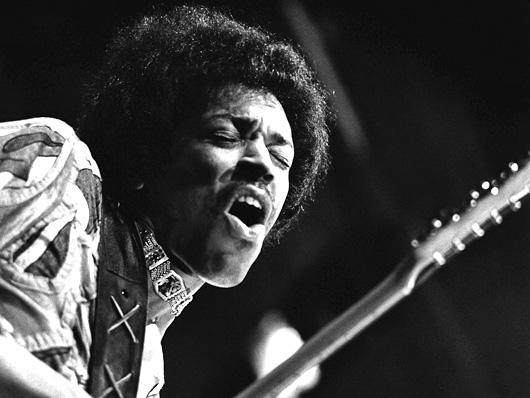
Voodoo Child (Slight Return)
14 percent of the total vote went to this stone cold classic cut from The Jimi Hendrix Experience's 1968 Electric Ladyland LP.
A by-product of the sprawling, bluesier Voodoo Chile from the same album, from its wah-wah intro to the rhythm parts and the astonishing solo, Voodoo Child (Slight Return) is still regarded by many as the high watermark of electric guitar expression. To say that you've picked a worthy winner is an understatement. Jimi, we salute you.
Why you love it:
"I think that one's up there with the best; it's bluesy and soulful but still heavy and ballsy. Plus Satch said that it was the best piece of guitar ever recorded." (Thanks, Shrexter)
"This is what springs to mind immediately when someone mentions classic riffs. Infectious, creative, skilful and I will never tire of hearing it... abso-bloody-lutely brilliant!!!" (Thanks, Craig222)
Missed part one? Check out numbers 50-26 here!

MusicRadar is the internet's most popular website for music-makers of all kinds, be they guitarists, drummers, keyboard players, DJs or producers.
GEAR: We help musicians find the best gear with top-ranking gear round-ups and high-quality, authoritative reviews by a wide team of highly experienced experts.
TIPS: We also provide tuition, from bite-sized tips to advanced work-outs and guidance from recognised musicians and stars.
STARS: We talk to artists and musicians about their creative processes, digging deep into the nuts and bolts of their gear and technique. We give fans an insight into the actual craft of music-making that no other music website can.